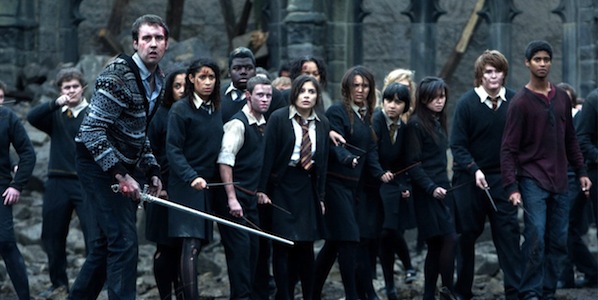The political blogger Digby recently reminded me of a John Stewart interview with J. K. Rowling that shines a light on the politics of Harry Potter. As it so happens, a political science major in my British fantasy class chose to write an essay on the subject and I share some of her ideas below.
Here’s the most relevant interchange between Stewart and Rowling, which captures my own views on patriotism, gratitude, and paying taxes:
Rowling: I couldn’t have written this book (Casual Vacancy) if I hadn’t had a few years where I had been, really, as poor as it is possible to go in the U.K. without being homeless. I mean, I had friends who helped me, but I had no friends or family who were in a position to give me a house, so we were on welfare—what you would call welfare I would call benefits.
Stewart: Aren’t you a perfect example of a good investment from the government? Has the government ever gotten back more of a good investment than from you?
Rowling: Absolutely. For which I was grateful and still am. I received a subsistence from the government for a relatively short period of my life. I pay a lot of tax. One reason I stay and pay, why I’m not based in Monaco, is I feel I owe them. My country helped me and there are places in the world where I would have starved.
To which the leftist Digby sarcastically responds,
She’s clearly a commie who doesn’t understand that her obligation to society is to keep every last grubby penny for herself.
Liana Fili, my student, reveals that the politics in Harry Potter are indeed left-leaning. The Death Eaters, particularly the Malfoys, stand in for old money. Liana points out that they oppose meritocracy and want to restore the old class ranking system:
Just as the Death Eaters castigate Muggles and Muggle-borns for inferior family ties, they also believe it is beneath them to help their inferiors. Often they do just the opposite and make Muggle hunting and terrorizing “inferior” witches and wizards a type of game or sport. Death Eaters also believe that any higher member of society who helps their “inferiors” is just as repulsive as the members of the lower classes. The Death Eaters are a small but strong minority and are continually fighting the rest of society to return to the old ways and ensure that they retain power…
Not all of the upper class wizards have Tory politics, however. Mr. Weasley, for instance, is fascinated by Muggle culture, and Harry’s father James, while he was a prig at times, married the Muggle-born Lily. Many of the wizards are essentially civil servants, working for the Ministry and making up what could be called the college-educated intelligentsia.
On the other hand, there are figures with Muggle blood who are particularly keen to hide it, such as Snape and, most notably, Voldemort. The resentment that drives them, a mixture of ambition and envy, prompts them to come down hard on Muggles. Call it the Clarence Thomas syndrome.
One sees class struggle in the rivalry between the Muggle-born Hermione and upper class Draco Malfoy. Here’s Liana again:
It is Draco’s social struggles with Hermione that most clearly display the struggle of the Tories to keep political power in the hands of the old families or upper class instead of making the government accessible to all accredited individuals. Draco is constantly trying to maintain his superiority over Hermione, even though she is smarter and more industrious, by socially degrading her and using class slurs. When Hermione explains how the Gryffindor Quidditch team is better than Slytherin’s because it is based on merit instead of financial status, Draco quickly does his best to discredit her. His reply is that “no one asked your opinion, you filthy Mudblood.” While Hermione has proven herself to be the more intellectually competent and compassionate individual in her treatment of her inferiors, to Draco this is inconsequential given her inferior pedigree. As Rowling highlights time and again, the use of tradition and class status in determining one’s worth is meaningless as Hermione later plays a key role in returning justice to society. Conversely, Draco actually inhibits justice and aims to maintain social inequalities through the protection and preservation of the unjust government. Rowling makes a very clear statement about how pedigree does not ensure whether one is intelligent or a superior person.
Hermione’s class status makes her particularly sensitive to the rights of the oppressed, such as the house elves (immigrants?), whose cause she takes up. Her feeling that she has to be twice as good as anyone else, meanwhile, is probably driven by her class insecurities. One notes the contrast with easy-going Ron Weasley, who has been born into privilege and so doesn’t understand her intensity. To his credit, however, he is no snob, in large part because of his liberal parents. (The same cannot be said of his older brother Percy, however.)
Liana notes that, at the conclusion of the series, the younger generation is able to bring about a democratic revolution in which the warring parties come to a bipartisan accommodation. Class will not figure so heavily in the new society and even the elves will have rights.
Now there’s a fantasy worth fighting for.



One Trackback
[…] Image via […]